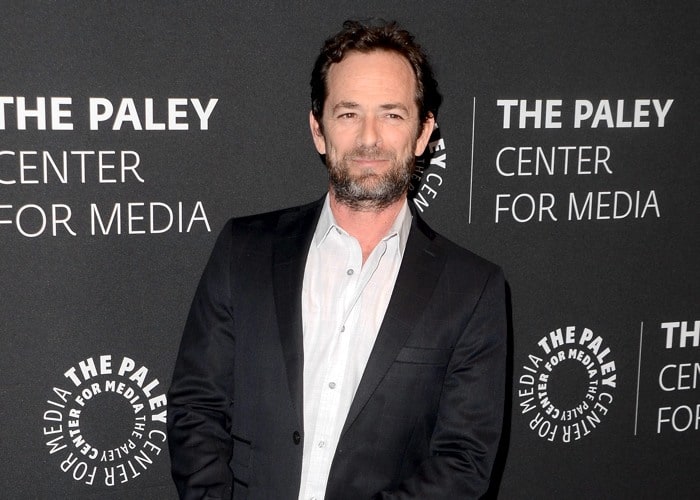
Luke Perry passed away this week after suffering a stroke at the young age of 52, bringing about the expected outpouring of grief from both lifelong fans and colleagues. But amongst the familiar sight of #RIP on social media and memories of a TV show that defined part of a generation, a picture of the man emerged, a picture as shocking as it was welcome: Luke Perry was a genuine Good Guy.
Born and raised on a series of farms in Ohio, Perry had a blue-collar, all-American childhood and adolescence, learning the handy work that would extend into his early twenties when he took jobs in construction and laying asphalt to make rent while looking for his break. But his upbringing was also mired with an abusive alcoholic father and a tendency to find solace in loneliness.
As he said in a 1992 Vanity Fair cover story, “I felt like another. It was never about escape. It was about wanting to feel like I belonged. I felt like I belonged on a screen. I don’t know why. I guess because I related to the people up on that screen much more than the people around me. I always felt like I was one of them, and in a matter of time I’d get there.”
The James Dean comparisons practically wrote themselves and, when he finally broke onto the scene with Beverly Hills 90210, he carried that moody weight into his portrayal of Dylan McKay, the ultra-rich high school sophomore and recovering alcoholic. It probably helped that Perry was 24 years old at the time of the premiere.
The show made him an instant and massive celebrity, in the way that creates cultural touchstones that people think about when they’re old and reminiscing, cementing his face and squint with people’s perception of The ’90s. But as a young celebrity, he came across as thoughtful, compassionate, and even opinionated. In that Vanity Fair interview, although it was conducted on the first day of the LA riots, Perry seems like he could be speaking in 2019:
“I think society has become oppressive in a lot of ways, and we’re a good outlet for all of that. I mean, that shit downtown is a perfect example. There are a lot of pent-up frustrations down there. This ain’t all about one thing: Rodney King. It’s symbolic: we’re living in a society that’s getting out of control. I don’t think it is a race issue—on some level certainly it is, but I saw white people down there screaming last night. I saw Hispanics. I saw Asians. I saw blacks. There were gays. There were straights. If nothing else, I see some beauty in what’s happening. You’ve got people you would ordinarily never see together. It inspired a passion in them… It’s unfortunate that it had to be something bad like that, but I think there’s a little bit of good in that, too,’ he theorized.”
His mid-career period consisted of largely ignored movies and some great TV roles in Oz and Jeremiah, but older millennials will fondly remember his turns on The Simpsons and Clone High, playing versions of himself and cementing his cultural coolness well past his heyday by making fun of his own image. In his off-screen life, he was constantly capable of these moments of unaffected coolness. This story from Twitter of Perry walking the picket lines during the 2007-2008 writers’ strike shows a man who lived in solidarity with working people well into millionaire status:
I met Luke Perry once during the '08 Writers Strike. The whole thing was deeply surreal. He got infuriated by someone talking shit to the writers and so he beat the guy's car with a picket sign. It was so fucking cool and again reminded me that his was not an attainable cool.
— David Iserson (@davidiserson) March 4, 2019
And this story, from Colin Hanks’ Instagram, of Perry calming a couple of rowdy children on a long flight with a balloon trick, is almost too heartwarming to believe:
https://www.instagram.com/p/BunCwtjFxRc/?utm_source=ig_web_copy_link
In recent years, Perry’s role as Archie’s father on the steamy, sexy Riverdale introduced him to an entirely new generation of teenagers, now as the cool dad trying to talk the young moody Archie through his struggles, all while riffing on the very same teen soap that made him a star. He was hesitant to make too much of that comparison, which he discusses in a 2017 Hollywood Reporter interview, saying, “It’s the story of a ruggedly handsome young man who has to pick between a dark-haired girl and a blond-haired girl, right? That’s where the similarity ends.”
Later this year, Perry will appear in Quentin Tarantino’s highly anticipated Once Upon A Time In Hollywood, a role that surely would have continued his return to “hire first” status. And that’s what makes his death particularly poignant. Not the ’90s teen heartthrob status, or the name recognition, but the fact that he died in middle age, by all accounts of a random quirk of biology. He was still committed to his work, only ever having fallen out of focus because, well, that’s what we do to teen heartthrobs. We get tired of them, and then make a universal agreement to not to let them be stars again until they survive post-fame. Luke Perry seemed to thrive. It’s a shame we won’t see the rest of his story.
Related Topics: Beverly Hills 90210, Luke Perry, Once Upon a Time in Hollywood, Riverdale

